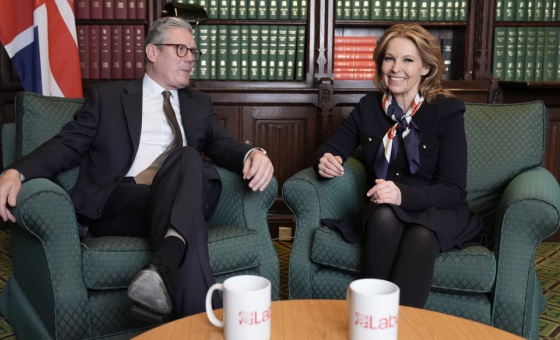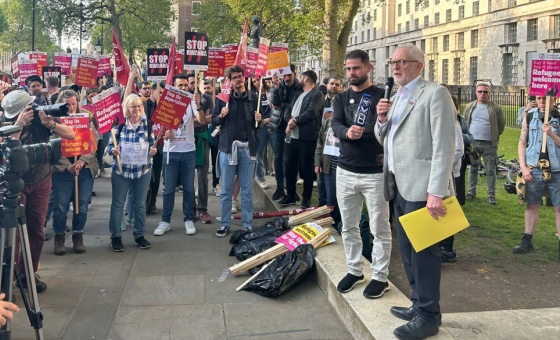This is the last article you can read this month
You can read more article this month
You can read more articles this month
Sorry your limit is up for this month
Reset on:
Please help support the Morning Star by subscribing here
WHAT politician would have wanted to be a member of the Smith Commission, knowing that at best you would stand accused of divvying up a compromise constitutional settlement for Scotland that no one really wants but everyone now feels tied in to deliver?
Sadly, had a third option for devolution been on the Scottish referendum ballot paper, our people might have had a less polarised, more meaningful debate over the past two years around devo-more and we could develop a constitutional framework that includes those priorities that the Scottish people (the 45 per cent and the 55 per cent alike) truly would like to see.
However, the referendum brought an invigoration of political engagement around hope and for change after years of austerity with many suffering pay freezes, pensions attacks, benefits sanctions and closures and withdrawal of key public services in their communities.
Even among the newly buoyant SNP, taking into membership one in 50 adults in Scotland, there is a nervousness that a return to politics as we know it anytime soon might see that bubble burst.
Within their swelling ranks there are many demanding that another referendum must be just around the corner.
Yes or No, the majority of working-class people in Scotland voted for a change to status quo austerity politics that has been the driving mantra of mainstream politicians, including the SNP, to date.
PCS members working for the Scottish government have seen their real-terms pay decline by more than 10 per cent since 2008, down to the fundamental refusal of Scottish ministers to break the Scottish public-sector pay cap, which is within their power to deliver. Neither Ed Balls nor John Swinney are about to change that.
With Nicola Sturgeon leading the SNP and a growing chance of Neil Findlay leading Scottish Labour, then just perhaps we might begin to see a realignment of the centre ground to the left.
Findlay and Sturgeon could reflect at the top of the two main Scottish political parties a dynamic around the the realisation of the priorities that the majority of people want.
An investment in the NHS and public services, a living wage for all, universal benefits, improved workers' rights and the removal of Trident.
But then again Jim Murphy might win, giving Sturgeon a solo run at being the most progressive party leader in the Scottish Parliament to date.
And now that the politicians have reached their Heads of Agreement in time for St Andrew's Day, by Burns Night on January 25 we are to expect a legislative timetable.
The STUC has described the Smith Agreement as underwhelming, and indeed, it is of tame aspiration. What, we must ask, is the point of tax and welfare powers that merely adjust further who is administering austerity?
The tax and fiscal opportunities are partial, making the reality of meaningful tax redistribution limited.
Devolving additional welfare and employability provision is constrained within the proviso that any additional benefit paid to the most vulnerable by the Scottish government would be taken away by the overall UK welfare cap.
Most disappointing is the lack of employment powers and provisions in the agreement. Control over the minimum wage, employment and trade union law, equalities, health and safety and other employment-related powers could have made a real positive difference to the experience of workers and trade unionists in Scotland, setting the bar high.
Instead we now face a race to the bottom as the continual erosion on workplace rights accelerates by the Tory-led British government.
In the run-up to the general election, the Tories are attempting to undermine the PCS union. Across the British Civil Service, our reps have had their trade union facility time cut and denied. The final part of the jigsaw is that, department by department, Civil Service management is being instructed by Tory ministers to withdraw check-off facilities for the collection of trade union subs.
PCS is now forced to re-recruit every single member by direct debit. Late in November, our union uncovered a plot to break PCS by HMRC managers, one of our biggest employers, with union-busting tactics on a US-scale. Our general secretary Mark Serwotka describes this as the biggest siege on our trade union since GCHQ.
Thank goodness, here in Scotland, there is little appetite for such anti-union bullying from either the SNP government or Labour opposition.
The Working Together findings of the Mather Commission looks instead at the positive contribution of trade unions to collective bargaining.
Mather makes recommendations to the Scottish government not to cut trade-union facility time, but to extend it to equality and environmental reps.
Is it any wonder that greater devolved powers over employment, equalities and health and safety in Scotland are seen by many trade unionists as a positive opportunity and not a right-driven race to the bottom?
I am also pleased that Plaid Cymru is preparing a review of the anti-trade union laws. The devolved nations of this country need to lead the way in reversing the race to the bottom that now blights our workplace rights.
For PCS members working in UK Civil Service departments, the future looks particularly bleak. Not only are public-sector workers bearing the brunt of austerity through cuts to jobs, pay and pensions, office closures and plans for widespread privatisation of the Civil Service, the Smith Commission appears to have closed the door on any prospect of mass transfers to the Scottish government of tax or revenue workers in Scotland.
Whatever the final constitutional settlement for Scotland, PCS members as civil and public servants will be charged with the vital task of delivering government services to the public.
A 2013 survey of PCS Scottish members conducted by the University of Cardiff found that adequate funding, quality and accountability of public services to be the most important factors influencing how they might vote in the referendum.
Pensions, pay and jobs too were high on our members agenda, reflecting our robust policies and the ongoing national dispute we have with both the British and Scottish governments.
It is around these issues that PCS continues to challenge our employers - both the Scottish and Westminster governments.
Our ongoing national dispute is not going away for either Chancellor George Osborne or Deputy First Minister Swinney.
While the Scottish government continues to impose a 1 per cent pay cap on its own staff when it has the powers to do differently, PCS members will continue to campaign and take action against this direct and unfair assault on our standards of living in order to manage austerity.
Lynn Henderson is PCS Scottish secretary










